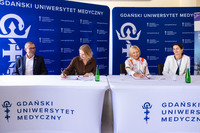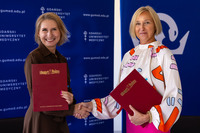New phantoms at the Medical University of Gdańsk
20.09.2024
Five phantoms went to the Department of Clinical Nutrition and Dietetics at the MUG today. They were donated by the Nutricia Foundation as part of the Direction – medical nutrition programme.
The Medical University of Gdańsk has been equipped with specialised equipment, including phantoms for teaching enteral nutrition (a paediatric one and one imitating an adult) and suits for simulating obesity and senile sensations.
The meeting, at which the agreement was signed, was attended by Nutricia Foundation CEO Anna Cywińska, Nutricia Foundation Project Manager Michał Sawicki, the Vice-Rector for Education at the MUG Prof. Agnieszka Zimmermann, the Dean of the Faculty of Health Sciences at the MUG Prof. Przemysław Rutkowski and Jolanta Dardzinska, Ph.D. from the Department of Clinical Nutrition and Dietetics.
The MUG has thus joined six other Polish medical universities cooperating with the Nutricia Foundation, i.e. the Medical University of Warsaw, the Medical University of Silesia in Katowice, the Pomeranian Medical University in Szczecin, the Medical University of Białystok, the Medical University of Lublin and the Collegium Medicum of Jan Kochanowski University in Kielce.
– The expansion of the educational programme in nutritional treatment at the Medical University of Gdańsk s an important step toward improving the quality of health care in Poland. As a result, our graduates will be better prepared to recognize and treat malnutrition, which is an essential component of effective therapy, explains Prof. Agnieszka Zimmermann, Vice-Rector for Education at the MUG. – Our cooperation will expand opportunities for the MUG students to acquire knowledge and skills through multisensory teaching using, among other things, phantoms and suits to simulate obesity or senile sensations. These will help students learn through realistic experience and allow them to build a greater awareness of the problems that sick people face.
Since 2012, hospitals have been assessing the nutritional status of every patient. In order for it to translate into concrete actions, education of doctors of all specialties is necessary. Medics directly order nutritional treatment, including enteral and parenteral nutrition. Consequently, it is important that basic information is imparted as early as medical school.
– According to the Foundation’s data, as many as 85% of students and doctors working in hospitals in Poland would not be able to initiate and lead nutrition intervention on their own, explains Anna Cywinska, CEO of the Nutricia Foundation. _– As many as 80% of patients in hospitals do not receive nutrition intervention despite indications, which can have a negative impact on the course and results of their therapy. This is particularly important for oncological patients, neurological patients, those with gastrointestinal diseases and kidney failure, who often require proper nutritional treatment.
– The Nutricia Foundation programme at the Medical University of Gdańsk is an important part of our strategy to train future medical staff in nutritional treatment. Thanks to this initiative, our students will gain a solid theoretical foundation and practical skills. I am convinced that this will translate into better patient care in the future, especially in areas such as oncology, geriatrics or nephrology, where proper nutrition plays a key role in the treatment process, concludes Prof. Sylwia Malgorzewicz from the Department of Clinical Nutrition at the Medical University of Gdańsk.
The MUG was one of the first universities in Poland to start training future doctors in clinical nutrition. – We are extremely proud that this year the MUG has joined our ‘Direction – medical nutrition programme’. Our cooperation with one of the leading medical universities in Poland is a growth opportunity for our programme. We believe it gives future medical staff a real chance to gain the necessary education and awareness of the role of proper nutrition in the treatment process, adds CEO Anna Cywinska. As part of the cooperation established with the Foundation, the clinical nutrition subject, which has been implemented for several years at the MUG in the third year of medical studies, will be enriched with important practical elements. In addition, the Foundation will also support the subject of nutritional assessment, which will include 45 hours of classes in the form of seminars and practical exercises. This subject will appear in the curriculum of th first-year dietetics (50 third-year students) and part-time dietetics (15 third-year students).
The expansion of the educational programme in nutritional treatment is another step toward improving the quality of education and preparing future doctors for holistic patient care.– As dean, I am delighted that students are getting a chance to learn in a practical way that reflects clinical reality, said Prof. Przemyslaw Rutkowski, the Dean of the Faculty of Health Sciences – At the same time, I am worried about the results of the survey, because it means that we are still doing too little in this area. Phantoms are a real chance to improve this situation.
photos: Paweł Sudara/MUG
Archives
- Academic Year 2024/2025
- Academic Year 2023/2024
- Academic Year 2022/2023
- Academic Year 2021/2022
- Academic Year 2020/2021
- Academic Year 2019/2020
- Academic Year 2018/2019
- Academic Year 2017/2018
- Academic Year 2016/2017
- Academic Year 2015/2016
- Academic Year 2014/2015
- Academic Year 2013/2014
- Academic Year 2012/2013



